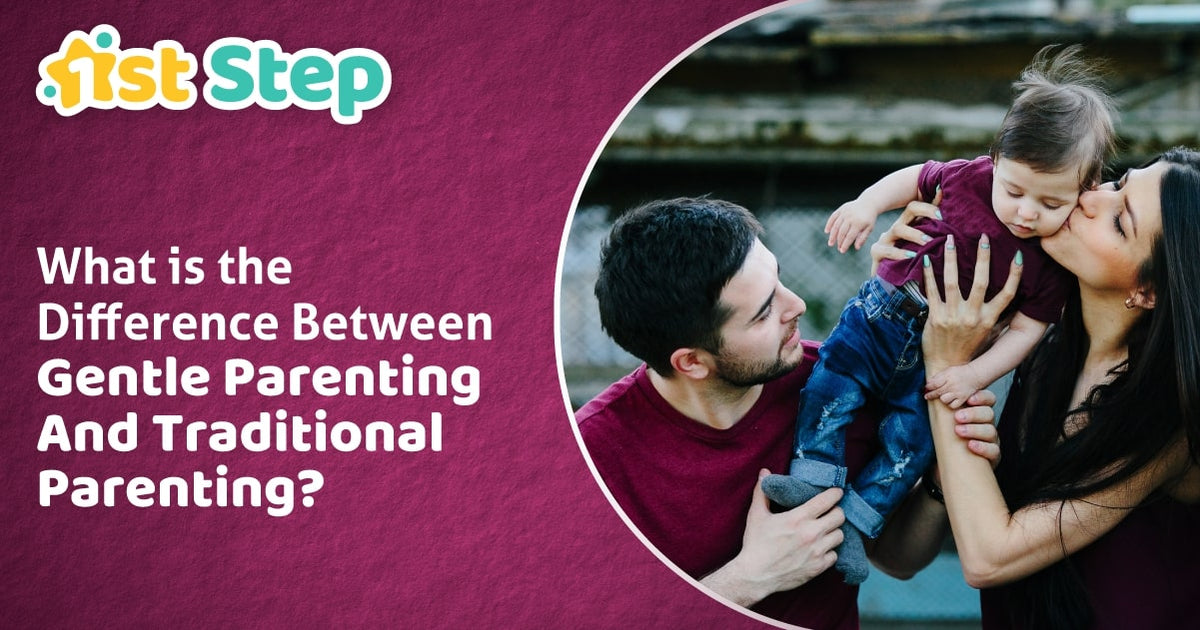What is the Difference Between Gentle Parenting and Traditional Parenting?
Let’s dive into this article, where we start a fascinating investigation into the parenting sphere. Today, we explore the fascinating differences between gentle vs traditional parenting, providing new views and perspectives.
Imagine a society where parenting values empathy, understanding, and open communication rather than harsh command and punishment. In these situations, gentle parenting manifests as a transforming strategy. A loving atmosphere that prioritises emotional connection and respects a child's individuality is encouraged by gentle parenting, as opposed to traditional parenting, which frequently depends on strict rules, obedience, and a power dynamic.
Join us as we explore the subtle differences, revealing how gentle parenting promotes positive connections, emotional acuity, and independence while questioning traditional approaches.
Learn how to lead small hearts with care and understanding, the beauty of empathy, and the force of positive discipline. It's time to start this educational trip through many parenting paradigms. Let’s go!
What is The Difference Between Both?
|
Gentle Parenting |
Traditional Parenting |
|
|
|
|
|
|
|
|
|
|
|
|
|
|
It's essential to remember that these differences fall along a spectrum, and parenting approaches might change even within the same group.
What is Gentle Parenting?

The key elements behind gentle parenting:
- Empathy
- Positive discipline
- Respectful parent-child relationship
The idea behind gentle parenting is to transform how we nurture our kids by moving in harmony with their little hearts. At its root is empathy, a powerful elixir that feeds compassion and understanding. It embraces the practice of actively listening, validating the other person's feelings, and reacting in a supportive and loving manner.
Gentle parents develop into adept storytellers who seamlessly incorporate lessons and explanations into daily life. They encourage communication, enabling their kids to thrive in a setting of mutual respect and trust. They nurture the souls that will create a compassionate world by developing independence, emotional intelligence, and true self-expression with soft hands and kind hearts.
What is Traditional Parenting?

The key elements behind traditional parenting:
- Strict boundaries
- Obedience and compliance,
- Emphasis on authority and discipline
A separate story is woven by traditional parenting, an age-old symphony of power and punishment. It stands tall with rigid guidelines and demands, trying to shape kids into certain social stereotypes. Its foundation is solid and based on the conviction that compliance and obedience are of utmost importance.
The knowledge of traditional parents is used to discipline their kids through clear rules and strong boundaries. Rewards and penalties play a role in modifying behaviour and ingraining values. Traditional parenting may be viewed as a beacon of organisation and structure, but it may unintentionally obscure uniqueness and emotional development. However, fortitude and respect can blossom within its confines, providing a window into the customs that have moulded centuries.
First Step - The Right Place for your Babycare Needs
Enter First Step's welcoming arms to discover shelter for your baby-care needs. It welcomes you with wide arms and leads you through the enchanted adventure of parenthood like a lighthouse in a storm. Whispers of peace can be heard among the thoughtfully arranged shelves, where each item has been painstakingly chosen with your child in mind.
First Step is a haven of all things baby care, from soft blankets that envelop your baby in a world of warmth to mild skincare items that nourish sensitive skin. A knowledgeable staff with sunshine-coloured grins is on hand to help, providing insight and direction on even the most delicate of topics.
Every step you take within these walls reveals a dedication to safety, quality, and love. First Step understands that your baby deserves nothing less than the very best, and with every purchase, you become part of a community built on trust and shared joy. Let First Step be your trusted companion on this wondrous voyage, ensuring that each step you take is filled with love, warmth, and care.
Takeaway
The core approach to loving and guiding children is where gentle parenting differs from traditional parenting. Understanding children's feelings and needs is a key component of gentle parenting, which also emphasises respect, sensitivity, and effective positive discipline. It develops independence, emotional intelligence, and a solid parent-child bond in a caring setting.
Traditional parenting, on the other hand, is based on rigid rules, submission, and a power hierarchy. Traditional parenting may provide structure and discipline but neglect a child's uniqueness and emotional development.
As we work to establish a caring and supportive environment for our children's holistic development, the decision between different parenting approaches ultimately comes down to personal ideas and values.
Frequently Asked Questions (FAQs)
1. What are the three different parenting styles?
Authoritarian, permissive, and authoritative are the three types of parenting. Permissive parents are forgiving and indulgent, while authoritative parents are firm but nurturing, encouraging independence and outlining expectations. Authoritarian parents are strict and controlling.
2. What are the pillars of gentle parenting?
Empathy, respect, good communication, and establishing appropriate limits are the cornerstones of gentle parenting. It focuses on recognising and attending to a child's needs, creating a caring and supportive atmosphere, and encouraging constructive discipline methods founded on empathy and respect for others.
3. Do gentle parents say no?
Kind parents will indeed object when necessary. To help kids comprehend and benefit from the established boundaries, they employ positive discipline strategies that emphasise giving explanations, providing alternatives, and having respectful conversations.
4. What is the opposite of gentle parenting?
Harsh or authoritarian parenting, which entails strong control, punishment-based discipline, and a lack of emphasis on empathy and understanding of a child's needs, can be contrasted with gentle parenting.
5. Why is gentle parenting the best?
The notion that gentle parenting is "best" is random and depends on personal values and ideas. However, individuals contend that it encourages children to grow in empathy, self-control, and independence through gentle supervision and understanding. They also claim that it develops strong parent-child interactions.

